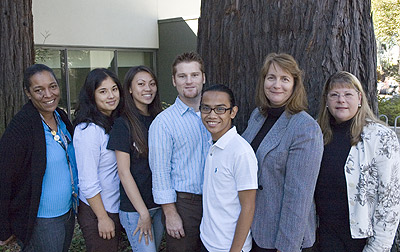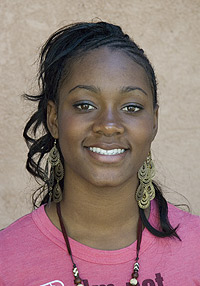Berkeleyan
 |
This team of staff and student mentors from Residential and Student Service Programs is part of a campuswide collaboration to help independent students succeed at Berkeley. From left to right: Elaine Perkins, Mary Kay Chin, Jenny Li, Scott Berry, Adrien Salazar, Nancy Jurich, and Michelle Kniffin. (Wendy Edelstein photos) |
A little caring makes a big difference
'Pay it forward' program hooks up independent students with the support they need to beat the odds
![]()
| 28 September 2006
The windfall that awaited Quanice Hawkins when she moved into residential Unit 1 last year was unlike any she'd ever experienced. Brand-new bedding, lamps, a robe and slippers, towels, a backpack, and other essentials were stacked high in the freshman's dorm room. This veritable Christmas in August was orchestrated by staff from Student Affairs and Residential and Student Service Programs (RSSP), who collectively donated $1,500 to help Hawkins and nine other students who arrived at Berkeley without parental financial support. These young adults, classified for financial-aid purposes as independent students, are or were wards of the court, orphans, or lacking parental support for confidential reasons.
 Quanice Hawkins was made to feel at home as a freshman by an ad-hoc group of staff concerned about the well-being of "independent students." |
"I had everything I needed the first day I moved in," recalls the soft-spoken young woman from Inglewood, in Southern California. And the freshman knew in advance exactly what she'd be getting, having been invited to select each donated item on Bed, Bath, and Beyond's website. "It did help financially, but more important was the support I got," says Hawkins, who got assistance from her mentor, Elaine Perkins of RSSP, on everything from choosing the right shade of purple for her comforter to getting to campus from the Oakland airport.
The welcoming reception Hawkins and her cohort received began as a grassroots effort that has evolved into a fledgling program, the Cal Independent Scholars Network.
Michelle Kniffin, an assistant director for housing assignments, and Nancy Jurich, her director in RSSP, spearheaded the endeavor after finding inspiration at a local fundraising event for Students Rising Above, a scholarship fund that helps low-income Bay Area youth overcome hardships to get through college.
At the fundraiser, Kniffin and Jurich heard Berkeley grad Kimberly Armstrong tell her story. Armstrong, who had been in the foster-care system, had come to campus by bus as an incoming freshman with just a duffel bag. She had watched her roommate unpack her many new belongings, then take off for dinner with her picture-perfect family. When Kniffin and Jurich heard Armstrong recall that she had cried herself to sleep that first night, the two women looked at each other and vowed, "Never again."
Kniffin related Armstrong's story in an e-mail to Student Affairs and RSSP staff, and asked for assistance in preventing its repetition among future freshmen. "I was flooded with e-mails from people who wanted to help" by donating money or linen sets, recalls Kniffin. While independent students attend Berkeley on financial aid, those packages aren't designed to cover the costs of residence-hall room furnishings and other necessities.
With the help of Financial Aid, Kniffin and Jurich located students in need, then e-mailed them to ask whether they wished to participate in the program. (All assented.) More than 60 staff and student volunteers picked up boxes of supplies and delivered them to the students' residence-hall rooms prior to their arrival. "It is really a campuswide collaboration," says Kniffin proudly.
More heart than money
"We did it with more heart than money last year," says Jurich. Staff donations covered room furnishings for Hawkins and one other student, and academic supplies (including backpacks) for eight more freshmen. This year, Fred Selinger '61, an investment banker, donated $10,000, enough to cover room furnishings and academic supplies for 12 incoming freshmen.
Selinger, who raised a foster son in addition to his three daughters (one of whom is also a Berkeley grad), has volunteered as an economics teacher in Bay Area inner-city high schools for the past 10 years. He says he was "well aware that foster children are put out on the street on their 18th birthday, and that there are students at Cal who were in need."
Just by making it to college, independent students are beating the odds, since only 40 to 50 percent of youth in the foster-care system graduate from high school, and only 1 or 2 percent earn a college degree. "These students are survivors," says Selinger. "They got into Berkeley because of their academic ability. Some of them were in adverse living situations and came through them." Now, he says, "it's important that they feel someone is there supporting them and caring about the issues they might have."
That support comes from a dedicated group of mentors. Each incoming independent student gets matched with a student mentor as well as a faculty, staff, or parent mentor. Mentors check in monthly with each student throughout the year, and update Kniffin, who acts as CISN's de facto coordinator, on any student's needs or challenges.
That involvement begins in early August, before students come to campus. "We want to make sure they're not alone on their first day," says Jurich. This past August, Jane Cullinan, a Cal parent, drove to the Oakland airport to pick up the student she was mentoring, then brought her to campus. When they arrived at the student's new dorm room, they found the other two roommates in the student's triple had staked out more than their fair share of turf. Cullinan went into mom mode, and soon there was space for her student's belongings. "Kids need an advocate - that's what parents are for," observes Cullinan.
Those for whom nothing is a given
Mentors also keep tabs on student birthdays - Cal Dining is donating a cake for each one - and check on where they plan to stay during Thanksgiving, winter, and summer breaks. "We help our students think through the questions that are a given for other students," explains Kniffin.
In exchange for the goods and support, participants agree that they will serve as mentors to future independent students. "Students understand and appreciate that this is not charity, it's a pay-it-forward program," explains Kniffin, whose goal is to help the students start on an even keel with their more affluent classmates.
Now a sophomore and living off campus, Quanice Hawkins is already mentoring a freshman. She still depends on her friends in RSSP for everything from counseling on boy problems to help locating campus resources. "They're a big part of my life at Cal. I can talk to them about anything," she says. "When I go in there, there's a family vibe. They help me. You want to go where you're loved."
For information on the Cal Independent Scholars Network, e-mail Michelle Kniffin at kniffin@berkeley.edu.

